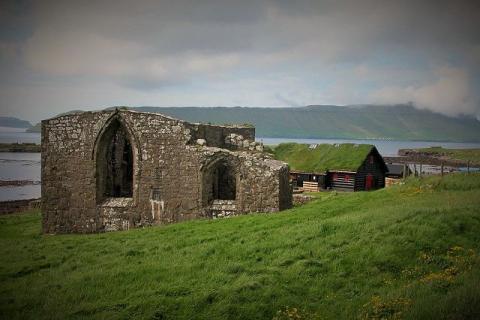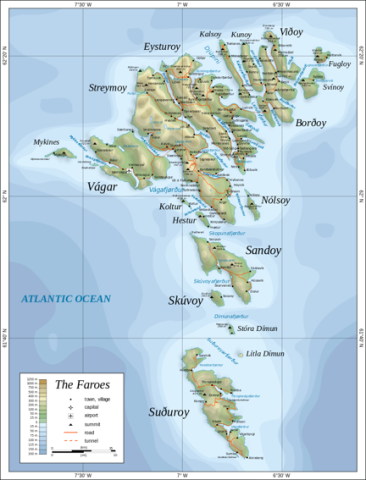[13] Sānctus Brendānus, ēlevātō illō dē terrā et datō ōsculō, dīxit: “Fīlī, Dominus noster Iēsus Chrīstus prōposuit nōbīs locum, ubi celebrāre possumus sānctam suam resurrēctiōnem.” [14] Cui ait praedictus vir: “Pater, hīc celebrābitis istud Sabbatum Sānctum; vigiliās vērō et missās crās in illā īnsulā, quam vōs vidētis, prōposuit vōbīs Deus celebrāre suae resurrēctiōnis.” [15] Dum haec dīxisset, coepit obsequium famulōrum Deī et omnia quae necessāria erant in crāstinum praeparāre.
[16] Fīnītīs omnibus et allātīs nāvī, dīxit ad sānctum Brendānum praedictus vir: [17] “Vestra nāvicula nōn potest amplius portāre. Ego vōbīs trānsmittam post octo diēs quae vōbīs necessāria sunt dē cibō et dē pōtū usque in Pentēcostēn.” [18] Sānctus Brendānus dīxit: “Unde tū nōstī ubi erimus post octo diēs?” [19] Cuī ait: “Hāc nocte eritis in illā īnsulā quam vōs vidētis prope, et crās usque in sextam hōram. [20] Posteā nāvigābitis ad aliam īnsulam, quae est nōn longē ab istā īnsulā contrā occidentālem plāgam, quae vocātur Paradīsus Avium, ibique manēbitis usque in octāvās Pentēcostēn.”
notes
The procurator is embraced by Brendan, and then explains what will happen next: the monks will stay on the Island of Sheep (Chapter 9) for most of the next day, Holy Saturday. Later that day, for Easter Eve, they will go to a nearby island (actually the whale Iasconius, chapter 10). On Holy Saturday, as the monks are preparing to go to the new island, the procurator tells them he will meet them later with more provisions, which will last till Pentecost (i.e. for 50 days); after spending Easter Eve and part of Easter on that nearby island (Iasconius), they will go to a third island, the Paradise of Birds, for the rest of Easter. They will stay there until the week after Pentecost ("the octave of Pentecost").
[13] Fīlī: masculine singular vocative.
noster Iēsus Chrīstus prōposuit nōbis locum: it turns out that Brendan is wrong about this; see 9.14.
[14] vigiliās vērō et missās ... suae resurrēctiōnis: despite the awkward separation, the genitive of suae resurrēctionis depends on vigiliās ... et missās.
celebrāre suae resurrēctiōnis: CL would be celebrāre
... resurrēctiōnem suam.
in illā īnsulā, quam vōs vidētis: the vir points to "that island," visible in the distance.
[15] Dum haec dīxisset: CL would be cum haec dīxisset.
coepit obsequium famulōrum Deī: “he began attendance on the servants of God”; this may mean that he washed their feet.
in crāstinum: = in (diem) crāstinum.
[17] Ego vōbīs trānsmittam: see 11.39.
usque in Pentēcostēn: “until Pentecost.” Pentecost is the celebration of the descent of the Holy Spirit upon the followers of Jesus (Acts 2). It takes place fifty days after Easter (πεντηκοστή ἡμέρα, “the fiftieth day”), and in theory is second only to Easter as a Christian holy day.
[18] Unde tū nōstī: Brendan’s question receives no answer; the vir, as a divinely inspired person, concentrates on what will happen next.
post octo diēs: we would say “seven days later” or “the same time next week”; the Roman practice was to count inclusively.
[20] Paradīsus Avium: see ch. 11.
usque in octāvās Pentēcostēn: “until the octave of Pentecost.” A liturgical octave (octava dies) was (and is) a week-long celebration after a particular holy day. The week was considered to last eight days because the Romans counted inclusively: one Sunday, for example, falls “on the eighth day” after the previous one. The medieval church celebrated a number of holy days in this way, but the Roman Catholic Church now recognizes octaves only after Easter and Christmas. It recognized the octave of Pentecost until 1969.
vocabulary
| ōsculum –ī n. | kiss 13 |
| Iēsūs –ū m. | Jesus (Christ) |
| Christus –ī m. | Christ |
| resurrectiō –ōnis f. | resurrection, rising from the dead |
| praedīcō praedīcere praedīxī praedictus | to say beforehand; mention 14 |
| Sabbata –ōrum n. pl. | the Sabbath; Saturday (LL) |
| vigilia vigiliae f. | a keeping of the watch; religious vigil [OLD 4] |
| missa –ae f. | the Mass (religious service) (LL) |
| crās | tomorrow |
| resurrectiō –ōnis f. | resurrection, rising from the dead |
| obsequium –ī n. | deference, solicitude 15 |
| famulus –ī m. | servant |
| necessārius –a –um | necessary, essential |
| crāstinus –a –um | pertaining to tomorrow |
| praeparō –parāre –parāvī –parātus |
to prepare, make preparations |
| fīniō fīnīre fīnīvī fīnītus | to finish 16 |
| praedīcō praedīcere praedīxī praedictus | to say beforehand; mention |
| nāvicula –ae f. | boat (ML); (CL) small boat 17 |
| amplius | further, more, in addition |
| trānsmittō –ere –mīsī –missus | to send across; bear or convey across or over |
| octō; octāvus –a –um | 8; 8th |
| necessārius –a –um | necessary, essential |
| pōtus pōtūs m. | a drinking, a drink |
| ūsque | until (often with ad or dum) |
| Pentēcostē –ēs f. | Pentecost |
| octō; octāvus –a –um | 8; 8th 18 |
| crās | tomorrow 19 |
| ūsque | until (often with ad or dum) |
| sex; sextus –a –um | 6; 6th |
| nāvigō nāvigāre nāvigāvī nāvigātus | to go by ship, sail; to row 20 |
| contrā | against; towards, in the direction of [OLD 14a] |
| occidentālis –e | of the west, westerly |
| plaga –ae f. | open expanse, tract; region |
| paradīsus –ī m. | Paradise |
| ūsque | until (often with ad or dum) |
| octāvus -–a –um | 8th |
| Pentēcostē –ēs f. | Pentecost |



